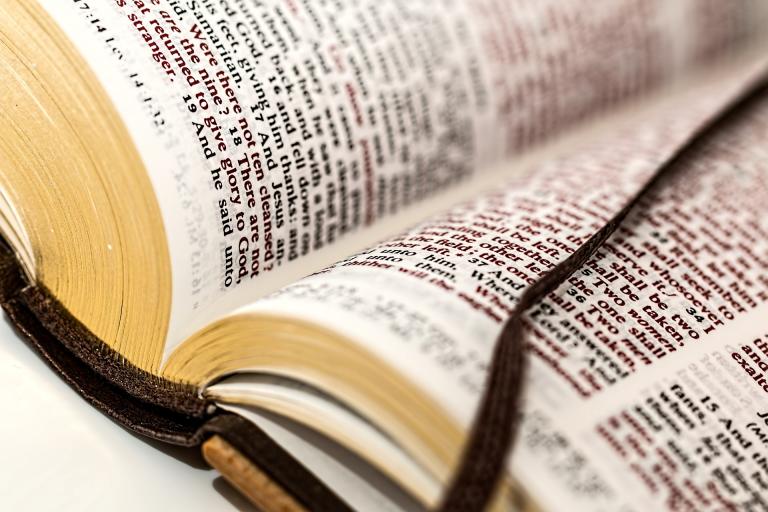The Bible is a really good book, most people would agree, but who has time to read all that stuff? So a Christian publisher in the U.K. has come up with The One Hour Bible: From Adam to Apocalypse in Sixty Minutes.
This is not a paraphrase, but rather an edition that gives certain key episodes and passages. The pared down Bible comes in at a mere 112 pages, which can be read in a single hour.
The book will not be available on Amazon until November, though you can pre-order it at the links I have given. I don’t know what translation is used. But I did find this outline on the SPCK website (the letters standing for the Society for Promoting Christian Knowledge, a respected Christian publisher that has been around for a long time):
PART ONE: SCENES FROM THE OLD TESTAMENT
Prologue In the beginning
1 From Eden to Babel
2 Abraham, Isaac and Jacob
3 Joseph in Egypt
4 Moses and the Exodus
5 Israel in the wilderness
6 The Promised Land
7 Samson and Delilah
8 The story of Ruth
9 Samuel, Saul and David
10 Solomon the sage
11 Elijah the prophet
12 The story of Jonah
13 Exile and returnEpilogue A prophecy
PART TWO: SCENES FROM THE NEW TESTAMENT
Prologue In the beginning
14 Jesus is born
15 The healer
16 The teacher
17 The sacrifice
18 Acts of the apostlesEpilogue A vision
So, nothing from the Epistles? Nothing that explains the significance of these events?
Here is an interview with the editor, Philip Law on his methodology and what he wanted to accomplish in his edition:
CT:How did you decide what to put in and what to leave out?
PL: Jesus says in John 5.39: ‘You search the Scriptures because you think they give you eternal life. But the Scriptures point to me!’ That’s one deciding factor that I tried to keep in mind. Another was whether the story, character or theme was going to help the reader connect with God and get to know the ways in which God reaches out to the world in order to heal and redeem it. And a third factor was the desire to take those stories, characters and themes that many people still think of as biblical – perhaps from hearing them as children, or perhaps from paintings, music or films they’ve come across as adults – and assemble them into a continuous narrative that shows how the famous bits fit together into the bigger picture.CT: Were there any texts you particularly agonised over?
PL: Yes! I agonised over lots that in the end had to be left out – the stories of Esther and Job, to give two examples. And I agonised for hours over which bits of the Gospels to include. In the end, as I say in the book’s introduction, I decided to select passages that give a good sense of what most New Testament scholars would say are the most distinctive elements of Jesus’ ministry – his emphasis on the need for love to guide our relationships; his concern for the poor, the diseased and disabled; his readiness to eat and mix with social outcasts; his relaxed attitude to Jewish food laws; and his genius for teaching in parables.CT: What would you say to people who argue that the whole Bible is God’s word and you shouldn’t be abbreviating it?
PL: Both on the cover of The One Hour Bible and in the introduction I try to make it clear that this isn’t intended as a substitute for the Bible, but a way of encouraging people to start reading it – some of whom might not otherwise read it at all. At the same time, there are lots of Christians whose only contact with the Bible is through the little bits they hear in church on a Sunday, and so I’d like to think that The One Hour Bible is for them too – that it will help them to put those apparently random bits together and instill a desire to read and reflect on it more for themselves, either on their own or in a group with other Christians.
The problem with selection is that one’s choices of what to include and what to cut out will convey a particular theology.
I don’t know what I think of this. It will give portions of God’s Word. That is enough to create faith in the hearts of readers. You don’t have to read all of the Bible for the Law and Gospel to break through to you. Reading short passages or single books can have that effect, so why not a streamlined edition?
Still, I am leery. Do you think such a project would bring down the curse at the end of the Bible’s final book?:
I warn everyone who hears the words of the prophecy of this book: if anyone adds to them, God will add to him the plagues described in this book, and if anyone takes away from the words of the book of this prophecy, God will take away his share in the tree of life and in the holy city, which are described in this book. (Revelation 22:18-19)
I suppose that would only apply to the editor. I know I would never dare to take on a project like this. God gave us the whole of Scripture and did so for a reason. Even human authors don’t like their books tampered with.
As a reader, I would think that going through the major Bible stories would be an hour well-spent. And yet, though the editor says his intention is to encourage readers to take on the whole Bible, I suspect that many won’t. They will have a “Bible Lite” to go with their “Christianity Lite.”
Besides, I have always disliked abridged versions of novels and other great works of literature. I want to read the whole work, and I’ll make my own judgments about what is important. And if I want to skip and skim, I want to be able to do that on my own, rather than trusting the skipping and skimming of someone else.
What do you think?
Photo by Stevepb via Pixabay, CC0, Public Domain













